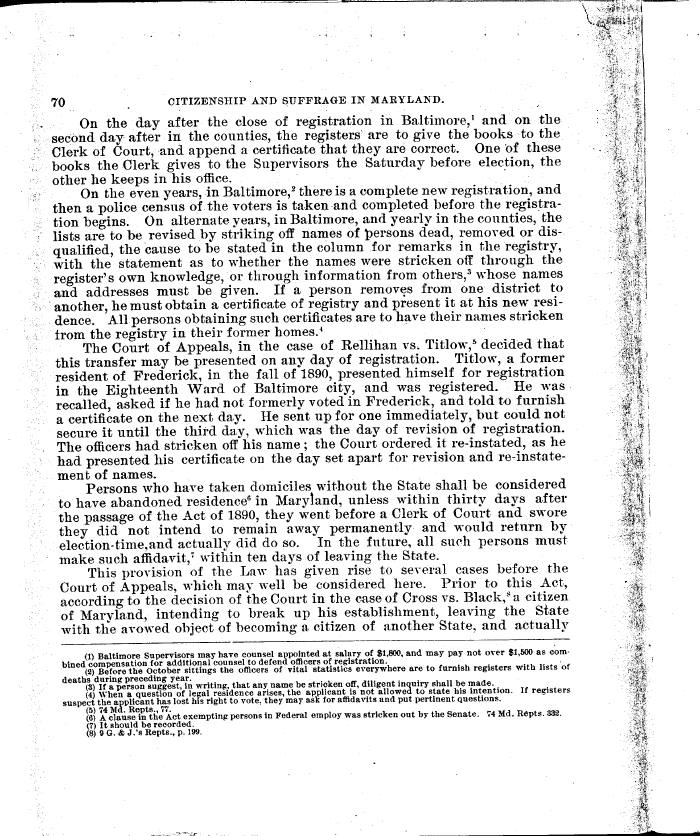|
7O CITIZENSHIP AND SUFFRAGE IN MARYLAND. ,
On the. day after the close of registration in Baltimore,' and on the
. second day after in the counties, the registers' are to give the boobs to
the
Clerk of Court, and append a certificate that they are correct. One of these
a books the Clerk gives to the Supervisors the Saturday before election, the
other he keeps in his office.
On the even years, .in Baltimore ,2 there is a complete new registration,
and
then a police census of the voters is taken and completed before the
registra-
tion begins. On alternate years, in Baltimore, and yearly in the counties,
the
lists are to be revised by striking off names of persons dead, removed or
dis-
qualified, the cause to be stated in the column .for remarks in the
registry,
with the statement as to whether the names were stricken off through the
register's own knowledge, or through information from others ,3 whose names
and addresses must be given. If a person removes from one district to
another, he must obtain a certificate of registry and present it at his new
resi-
dence. All persons obtaining such certificates are to have their names
stricken
from the registry in their former homes.'
The Court of Appeals, in the case of Rellihan vs. Titlow,5 decided that
this transfer may be presented on any day of registration. Titlow, a former
resident of Frederick, in the fall of 1890, presented himself for
registration
in the Eighteenth Ward of Baltimore city, and was registered. He uses
recalled, asked if he had not. formerly voted in Frederick, and told to
furnish
a certificate on the next day. He sent up for one immediately, but could not
secure it until the third day, which was the day of revision of
registration.
The officers had stricken off his name; the Court ordered it re-instated,
as he
had presented his certificate on the day set apart for revision and
re-instate-
ment of names.
Persons who have taken domiciles without the State shall be considered
to have abandoned residence' in Maryland, unless within thirty days after
the passage of the Act of 1890, they went before a Clerk of Court and swore
they did not intend to remain away permanently and would return by
election-time,and actually did do so. In the future, all such persons must
make such affidavit,' within ten days of leaving the State.
This provision of the LaŤ- has given rise to several cases before the
Court of Appeals, which may well be considered here. Prior to this Act,
according to the decision of the Court in the case of Cross vs. Black,' a
citizen
of Maryland, intending to break up his establishment, leaving the Sate
with the avowed object of becoming a citizen of another State, and actually
(1) Baltimore Supervisors may have counsel appointed at salary of $1,800,
and may pay not over >d1,500 as com-
bined compensation for additional counsel to defend officers of
registration.
(2) Before the October sittings the officers of vital statistics everywhere
are to furnish registers with lists of
deaths during preceding year.
(3) If a person suggest, in writing, that any name be stricken off,
diligent inquiry shall be made.
(4) When a question of legal residence arises, the applicant is not allowed
to state his intention. If registers
suspect the. applicant has lost his right to vote, they map ask for
affidavits and put pertinent questions.
(5) 74 h(d. Repts., ii.
(G) A clause in the Act exempting persons in Federal employ was stricken
out by the Senate. S411id. Repts. 332.
(7) It should be recorded.
(8) 9 (,1. & J.'s Repts., p. 199.
|

